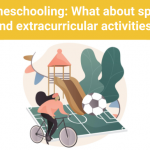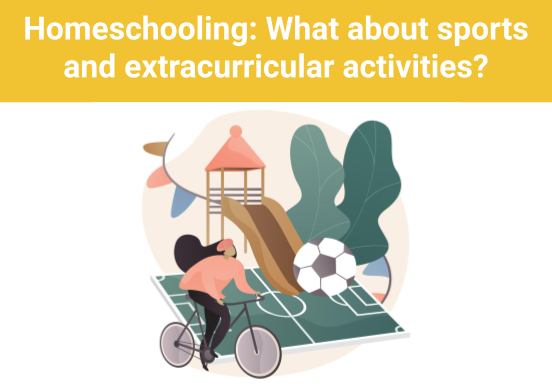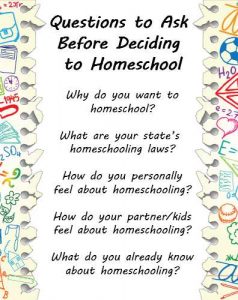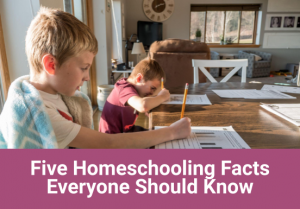Currently Browsing
Posts Tagged ‘ homeschooling ’
5 Homeschooling Facts Everyone Should Know
- 20 February //
- Posted in For Parents //
- Tags : homeschooling, parenting
- Comments Off on 5 Homeschooling Facts Everyone Should Know

There’s an ongoing trend in the US when it comes to education – across the country, homeschooling is increasingly being discussed and executed as an education option. That means there’s an estimated two million students, or approximately 3% of the K-12 students learning from home. This is a massive increase from the past, whereby the homeschool population has increased by 74% since 1999. Keep reading to learn important homeschooling facts.
One of the main drivers of parents choosing to homeschool their children lies with moral and religious instruction, but a growing number of parents are choosing to do so for a number of other reasons, including greater freedom to travel, a more flexible curriculum, and better attention to students. There are, of course, systemic problems in education that also feed into the decision-making, such as dissatisfaction with public schools, bullying, concerns about the safety of school environments, or medical or special needs of the child, to name just some.
Even with the growing number of homeschooled students and the mind shift that’s taken place as a result of lockdown and Covid-19 learning from home, homeschooling families often still face skepticism. Despite the skepticism, homeschooling figures rival charter school enrollment, and it is seen as a viable alternative to expensive private schools.
As a result, homeschooling rates will most likely continue to increase. Whether you are a homeschooling parent, thinking about homeschooling, or simply interested in educational trends, here is a primer on homeschooling:
Homeschooling Facts You Need to Know
1. Homeschooling is Legal
Homeschooling is legal in the US and has been since 1993. However, every state has it’s own rules and regulations. This means it’s really important to do your research when considering homeschooling your child. Ten states and two US territories have no homeschooling requirements, for example, while six have high regulations.
What this means is that in high regulation states, like Oregon, for example, you’ll need to keep track of your child’s test scores, undergo professional evaluation, submit curriculum planning, notify schools in writing of your intention to homeschool your child, and in some cases, even proving your ability and qualification to teach. In Nebraska, which is another high regulation state, homeschools are treated like private schools and must cover specific subjects.
By contrast, a low or no regulation state, like Alaska, homeschoolers are not required to notify the state or district of their intention to homeschool, and it’s also not required to keep test scores or keep track of student progress.
Confused? The National Home Education Network maintains an At-a-Glance State Information page for anyone looking to learn more about homeschool regulations.
2. Homeschooled Students are Socialized
The stereotype that a typical homeschooled student lacks social skills and sits at a desk six hours a day, working either in isolation or just with a parent, has been shattered over the past decade.
The increase in the number of homeschoolers has led to an increase in the number of homeschool organizations providing support, activities, outings, and resources. Often homeschooled students study with siblings and other local homeschoolers, are members of youth sports leagues, and even participate in public school co-curricular activities.
In fact, in states like New Hampshire, homeschoolers’ access to public school co-curricular activities is protected by law. Many museums, libraries, and organizations now offer programs geared specifically toward homeschoolers. For more information about homeschool organizations, visit Home Education Magazine’s state-by-state list of support groups.
You can rest assured that your child has the opportunity to score above average on measures of emotional, social, and psychological development when exposed to these activities. It’s also worth mentioning that while more research is still needed, adults who were homeschooled as children are believed to be more tolerant of politics than those that were schooled in the public system, and they’re also more likely to participate in community services as well as vote and participate in public meetings.
3. Homeschooling Can Be Affordable
How much does it cost to homeschool? This will depend on the family and choice of curriculum, but $700 to $1,400 annually per student is frequently cited.
While there is potentially money to be gained by homeschooling, the highest cost of homeschooling is often the loss of income when a parent leaves the workforce to stay at home and teach the kids. It may not come as a surprise that the increase in the rate of homeschooling has coincided with the widespread availability of the Internet.
Although the majority of homeschooled students come from two-parent families with a stay-at-home parent, the Internet has opened the doors to telecommuting, off-hour options, and freelance work, which has allowed many more parents to homeschool while still contributing to household incomes. Many families got to test run this way of living during the height of the Covid-19 pandemic and determining whether they could balance homeschooling alongside online work.
4. Homeschool Curriculum Choices are Abundant
One of the biggest areas of appeal with homeschooling is the variety of choices available when it comes to curriculum. There are many different philosophies and associated approaches to homeschooling, and the choice dictates the type of curriculum, for example, one might choose to stick to a more traditional structure of lessons and tests, or a family might choose to go with something more unorthodox like unschooling, where students choose what they learn.
Whatever philosophy you choose, resources are the next challenge. The purchase of curriculum packages or enrollment in an online program is a large portion of the direct cost of homeschooling a child. Considering students typically study several subject areas and require new materials and courses as they progress academically, the cost can add up over the years. However, with ingenuity and research, many families manage to educate their children at home on modest budgets. With the growing popularity of homeschooling, free and low-cost educational resources have flourished. For example, HelpTeaching.com and KidsKonnect.com offer printable worksheets for a wide range of grade levels and subjects.
Several major online schools provide courses for homeschooling students, and a number of elite universities, including the Massachusetts Institute of Technology, now offer massive open online courses, providing a free option for secondary students transitioning to college. Many homeschooling websites, like The Home School Mom, provide ample information to help parents make informed decisions as to the homeschooling method best for their children.
5. Homeschooling Isn’t Always a K-12 Commitment
It is not uncommon for families to homeschool for a period of time and then transition students into schools. Sometimes the homeschooling parent must return to work for financial reasons, the homeschool dynamic no longer works for the family, or the students themselves express the desire to enroll in school. The reverse can also be true. A student may transition from school to homeschooling when the current educational circumstances are not meeting the student’s needs. Some homeschool situations are temporary, for example, when a student is bullied, for family relocation or when a medical condition arises. Ideally, a strong partnership between parents and school personnel will help students transition either way successfully.
The decision to homeschool is a personal one, just as is the decision to send a student to the public, charter, private, or parochial school. The key is to make informed decisions about the best educational methods for each individual child.
Homeschooling: What about sports and extracurricular activities?
- 13 June //
- Posted in For Parents //
- Tags : extracurricular activities, homeschool, homeschooling, parenting, sports
- Comments Off on Homeschooling: What about sports and extracurricular activities?


Homeschooling your kids comes with a number of challenges to meet. You might worry about their social interaction, whether they’ll get to have prom like their public school-going peers, or even whether they want to participate in programs offered by a public school like band practice, cheerleading, choir, math groups, and others.
Public schools offer some popular and interesting events that may intrigue homeschoolers. Many teens will want to go to dances, learn how to drive, play on a team, or explore music. So, what are the answers to those challenging questions? There are several options:
Work Through the School District
Contact the local school district and see what its policy is on permitting homeschoolers to join the school’s events, teams, or groups. Be specific in what you are asking when you call. Schools might allow a teen to attend driver’s education classes, for example, but not permit attending the prom—or vice versa. Some schools are happy to accommodate homeschooling families with access to all activities, while others choose to completely restrict it. In addition to contacting the local public school, consider reaching out to area private and charter schools to see what their policies are on incorporating homeschoolers.
Look at Community Programs
While schools do offer some great activities, they are rarely the ONLY place to offer them. Look around to see what other choices you might have.
- If your teen wants to join a local sports team, check out the local YMCA to see what sports it has to offer. You can also see if there are any local leagues sponsored by businesses or community groups. Be sure to contact community centers, as they frequently offer a chance to play a variety of sports. Look at resources online such as Craigslist or Meetup.com to find clubs, teams, and other activities.
- Students who play instruments or sing can look into private lessons, as well as explore city orchestras and local music groups. Choirs are available through churches and other independent groups. Community theatres offer a chance to explore drama.
- Driver’s education courses are offered by many groups, including police organizations and independent companies. School enrollment is not necessary to participate in most of these courses. Parents can also purchase packaged driver’s education programs online and teach the subject themselves. National Driver Training Institute offers homeschooling programs. Just make sure you’re aware of the driver education laws in your state.
- Homeschoolers can typically attend prom if their partners are enrolled in the school. Perhaps your son or daughter’s main goal is just to dress up and go to a dance, rather than specifically the prom. If so, community dances are available in many cities.
Start Your Own
One trait homeschoolers tend to be known for is creating their own activities when they can’t find what they need within their communities. Support groups often have enough members that they are able to start a small sports team, a choir, a band, or an acting troupe. It takes time, effort, and dedication, of course, but many parents are willing to do it to help their children.
Homeschool proms are becoming more and more popular across the country. A 2 Z Home’s Cool lists a growing number of states that host these dances annually, including:
- Alabama
- California
- Indiana
- North Carolina
- Oklahoma
- Oregon
- Texas
- Tennessee
- Virginia
(For parents who are starting from scratch to organize a prom in their area, there is a helpful site with many resources on it at http://home-school.lovetoknow.com/Homeschool_Prom. It offers information on how to find the best location for the prom, how to budget the money, where to find flowers, food, and beverages and more.)
Homeschooling teens—and just parenting them—can be a complex combination of challenging and delightful. Having the answers to the most common questions that can arise is one way to make the trip a little easier—for everyone involved. To learn more about homeschooling, check out Homeschooling 101: An Introduction to the Laws and Legalities of Homeschooling and The Most Important Questions to Ask Before Deciding to Homeschool.
Tamra Orr is the author of six books on the topic of homeschooling, including Homeschooling FAQs: 101 Questions Every Parent Should Ask, The Parent’s Guide to Homeschooling, and After Homeschool: Fifteen Homeschoolers Out in the Real World. In addition, she homeschooled her four children from Kindergarten through high school graduation.
Homeschooling 101: Most Important Questions to Ask Before Deciding to Homeschool
- 17 March //
- Posted in For Parents //
- Tags : homeschool, homeschooling, parenting
- Comments Off on Homeschooling 101: Most Important Questions to Ask Before Deciding to Homeschool

If you’re thinking about homeschooling, it’s time for some homeschooling 101. Most parenting decisions involve asking a lot of questions and searching for the best answers. This is particularly true when it comes to making decisions about your children’s education. Today, parents have many options when it comes to choosing a type of schooling. What is the best choice? Public school, charter school, private school, virtual school, or homeschooling? Every family should conduct its own research and make a decision that meets the needs of their children.
If you’re thinking about homeschooling your son or daughter, what questions should you ask before making the decision? Here are some of the most important ones to consider:
Why do you want to homeschool?
 Give some thought as to why homeschooling appeals to you. Is it because a friend or someone else in the family has homeschooled? Is it because your child came home after a bad day at school and asked to be homeschooled? Is it because you’ve read a few articles, and you’re considering trying it? All of these can be valid reasons to think about homeschooling, but they are not sufficient answers. They need support. Just because one family homeschooled successfully doesn’t mean that it will work well for you. One bad day at school isn’t enough to decide to leave it behind.
Give some thought as to why homeschooling appeals to you. Is it because a friend or someone else in the family has homeschooled? Is it because your child came home after a bad day at school and asked to be homeschooled? Is it because you’ve read a few articles, and you’re considering trying it? All of these can be valid reasons to think about homeschooling, but they are not sufficient answers. They need support. Just because one family homeschooled successfully doesn’t mean that it will work well for you. One bad day at school isn’t enough to decide to leave it behind.
Take time to analyze why you may want to homeschool. Instead of a single bad day, is your child consistently suffering at school because of learning difficulties, bullying, or other problems? Instead of a relative homeschooling successfully, do you know multiple families who are doing it well? Instead of a few articles, have you read multiple books, attended a few workshops, or gone online and consulted multiple web sites?
John Holt, considered the original “father” of homeschooling, once wrote, “Why do people take or keep their children out of school? Mostly for three reasons: they think that raising their children is their business not the government’s; they enjoy being with their children and watching and helping them learn, and don’t want to give that up to others; they want to keep them from being hurt mentally, physically and spiritually.
What are your state’s homeschooling laws?
Although homeschooling is 100 percent legal in every state (since 1993), the laws are different in each state. The laws vary greatly from very lenient (Alaska, Connecticut, Idaho, Illinois, Indiana, Michigan, Missouri, New Jersey, Oklahoma, and Texas) to very strict (Massachusetts, New York, North Dakota, Pennsylvania, Rhode Island, and Vermont). You can find the laws for your state by either checking your department of education, the Home School Legal Defense Association or A to Z Homes Cool.
How much do you personally know about homeschooling?
There are a lot of myths and misunderstandings about home education and they can be very misleading when you’re trying to make the best decision. For example, do you think that only religious people homeschool—or only hippies do? Do you believe that homeschooling costs a great deal or takes a huge amount of time? Have you heard that homeschoolers can’t go to the prom, join sports teams, attend college or join the military? None of these statements are true. Believing that they are can lead to confusion—and poor decision making. Doing solid research about homeschooling can help dispel these myths and make it easier to make wiser decisions.
How does your child/partner/family feel about homeschooling?
Any family that homeschools has to do it as a unit—if a partner doesn’t agree with the choice, or if a child is against being homeschooled, it can be a real uphill battle. To get everyone “on board” with the decision means lots of discussions and sharing of thoughts, opinions, facts, and ideas. If your child is old enough, involving him or her in the decision making will help your child feel validated and listened to. Listen to each other’s concerns and questions, and find the answers together. Homeschooling is so much easier when the family is a team.
Do you know any of the current stats about homeschooling?
While national numbers may not seem to affect you directly, they can give you an idea of how homeschooling trends are developing across the country. According to the National Centers for Educational Statistics, 1.77 million children were homeschooled in 2012, an 18 percent increase over the numbers in 2007. The numbers have continued to climb with each passing year. (Note: Many experts believe there are many more homeschooling students than this, as this statistic only reflects state-registered homeschoolers, and many of families decline to register.)
According to the National Home Education Research Institute in Oregon, homeschoolers also score above average on SAT and ACT exams. Also, according to a study conducted at the University of St. Thomas, homeschoolers were shown to graduate college at a rate of 66.7 percent, which is almost 10 percent higher than students who attended traditional public school.
Making the best choice for your children’s education is never an easy decision, regardless of what you ultimately choose. Asking the right questions and getting reliable answers is the first step to figuring out the answers. Happy researching!
To learn more about homeschooling, check out Homeschooling 101: Sports and Other Extracurricular Activities and An Introduction to the Laws and Legalities of Homeschooling.
Tamra Orr is the author of six books on the topic of homeschooling, including Homeschooling FAQs: 101 Questions Every Parent Should Ask and After Homeschool: Fifteen Homeschoolers Out in the Real World. In addition, she homeschooled her four children from Kindergarten through high school graduation.
Homeschooling 101: An Introduction to the Laws and Legalities of Homeschooling
- 5 February //
- Posted in For Parents //
- Tags : homeschool, homeschooling, parenting
- Comments Off on Homeschooling 101: An Introduction to the Laws and Legalities of Homeschooling

When parents first consider homeschooling, they often start by wondering if teaching their own children is actually legal. The answer is yes. Homeschooling is legal in every state of the United States. (It is, however, outlawed in two dozen foreign countries.) That said, however, it is important to realize that homeschooling is governed by the individual states, rather than the country as a whole. The legalities of homeschooling differ widely from one state to the next. Some states are incredibly lenient and some are quite strict.
Notice of Intent
Commonly the first law that is referenced with homeschooling is whether or not parents have to contact the local school district to let them know they are planning to homeschool. Some states do not require this notice, while others require a simple parental notification—and that is it. Some parents elect to simply turn in a letter of intent with their names, addresses, and child’s name to the state and to the school district in which they live. Others may choose to include additional details about what subjects they will be covering.
States that do not require notification of intent to homeschool:
- Idaho
- Alaska
- Texas
- Oklahoma
- Missouri
- Illinois
- Indiana
- Michigan
- Connecticut
- New Jersey
States that require only notification of intent to homeschool:
- California
- Nevada
- Montana
- Wyoming
- Utah
- Arizona
- New Mexico
- Nebraska
- Kansas
- Wisconsin
- Kentucky
- Mississippi
- Alabama
Beyond the Basic Notification
Many states go beyond requiring notification. In addition to a notice of intent, they want to see student test scores and expect a professional evaluation of each student’s progress at the end of the year. The level at which these tests are administered depends on the state. Some states expect homeschooled students to be tested once at the elementary school level and once at high school. Others expect it as often as grades 4, 6, 8, and 10.
Moderately strict states:
- Washington
- Oregon
- Colorado
- South Dakota
- Minnesota
- Iowa
- Arkansas
- Louisiana
- Tennessee
- Ohio
- Georgia
- Florida
- South Carolina
- North Carolina
- Virginia
- West Virginia
- New Hampshire
- Maine
- Maryland
The strictest homeschooling states in the country are found on the east coast. These states require parental notification, in addition to professional evaluation (by an objective third party), and often curriculum approval from the state, parental teaching certification (minimum high school diploma or GED), and even, in extremely monitored states, home visits from state officials.
Most restrictive states:
- Vermont
- New York
- Pennsylvania
- Rhode Island
- Massachusetts
As an example, New York homeschoolers are required to submit a very detailed home instruction plan that lists the curriculum materials, textbooks, and other resources that will be used. In addition, parents must keep detailed attendance records to indicate that each student has been instructed at the legal equivalent of 180 days per year. (This breaks down to 900 hours for grades 1 through 6 and 990 for grades 7 through 12.) New Yorkers are also expected to submit annual homeschooling plans, plus quarterly reports with grades in all subjects. Here, standardized tests are administered in grades 4, 6, and 8, as well as every year of high school.
It is important to note that state homeschooling laws are not written in stone. They can—and often do—change with enough parental and organizational involvement. In recent years, Utah, Iowa, New Hampshire, Pennsylvania, and Minnesota have significantly reduced their requirements for homeschoolers.
Finding Additional Resources
Knowing what rules each state has in place to govern homeschooling is essential for all new homeschoolers, as well as for teachers whose students are leaving the system to be homeschooled. There are many online sites with this information, such as The Homeschooling Legal Defense Association, A to Z Home’s Cool and the Coalition for Responsible Home Education.
In addition to researching online, parents should connect with local and state homeschooling support groups and associations. Attend conferences. Go to the library and ask about homeschooling resources. All of these places can help parents and teachers better understand the laws in place and what they do and do not entail.
Deborah Stevenson, Executive Director of National Home Education Legal Defense (NHELD) stated in an interview with Home Education Magazine, “If citizens are not informed about the law and the facts affecting their rights under the law, they cannot effectively retain their freedom.” Stevenson encourages parents to not only read their state laws regarding homeschooling, but also read the U.S. and state Constitutions, and all state Department of Education and local Board of Education policies that focus on the right to homeschool. The key is being informed, so that if any family is questioned, they know their rights.
Larry and Susan Kaseman, authors and columnists for Home Education Magazine, write about how parents can maintain their homeschooling freedoms. In one column, they advocated having copies of state homeschooling statutes and regulations, but to rely heavily on speaking with experienced homeschoolers as well. “The best source of information is knowledgeable, experienced homeschoolers who live in the state you’re interested in,” they wrote.
The right to homeschool is one that is upheld in every state of this country. What parents need to do to keep and fulfill this right varies, however, so taking the time to do “home-school homework” is essential.
To learn more about homeschooling, check out Homeschooling 101: Most Important Questions to Ask Before Deciding to Homeschool and Sports and Other Extracurricular Activities.
Tamra Orr is the author of six books on the topic of homeschooling, including Homeschooling FAQs: 101 Questions Every Parent Should Ask, The Parent’s Guide to Homeschooling, and After Homeschool: Fifteen Homeschoolers Out in the Real World. In addition, she homeschooled her four children from Kindergarten through high school graduation.



